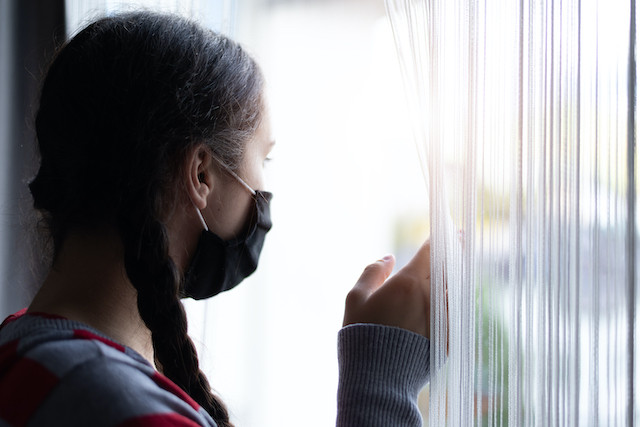Social isolation, loss of routine, adapting to digital ways of learning and constantly changing restrictions have left many of Luxembourg’s adolescents feeling anxious, depressed and overwhelmed with their feelings, explains KJT psychologist Aline Hartz: “Young people describe increased feelings of loneliness and isolation, they miss their friends, they feel 'restrained', aimless, under pressure, sad. They are uncertain about the future, feel pressure to perform, experience low self-esteem and suicidal thoughts.”
Since August 2020, the number of contacts at the KJT has been high says Hartz, as young people began struggling with the longevity of the restrictions, feeling frustrated and robbed off their freedom. And whereas these are feelings that resonate with the majority of the population at the current time, they might be particularly hard to cope with for young people trying to make sense of the transition from childhood to adulthood and faced with an uncertain future as well as fears of losing loved ones to the virus.
Growing demand for online help service among family tensions
Whereas the KJT notes that there has been no significant increase of incoming calls, the helpline’s online service has experienced stronger demand (313 contacts in 2020 compared to 237 in 2019). Unsurprisingly, says Hartz: “This supports our hypothesis that children and youth have difficulty making phone calls because the family members are all at home, their private space is considerably reduced. It is therefore easier to write than to phone.”
The lack of privacy forced upon young people by lockdown measures, parents’ new teleworking routines and homeschooling has left many of them overwhelmed with the situation and, as a result, reporting more conflict with parents and siblings. “The intensity of conflict in the family was partly more intense this year; since everyone was more at home, the potential for conflict is naturally increased,” explains Hartz.
She also points out that the amount of young people taking advantage of the KJT’s online help with regards to situations involving neglect, abuse, harassment and cyber harassment as well as physical, sexual as well as emotional violence, had almost tripled, from 11 contacts in 2019 to 29 in 2020. And indeed, particularly cyber harassment and cyber violence among children is something that has been of rising concern to multiple professionals, exacerbated by the increased use of digital tools for homeschooling purposes.
“Problems have been accentuated or intensified”
The numbers speak a clear language and point towards the detrimental effects of the ongoing situation on the mental state of young people, with more and more children and adolescents reaching out to the KJT because of increased worries, anxiety and depression.
Most concerning, however, is the amount of contacts the online helpline recorded in relation to suicidal thoughts, as this number doubled last year, from 23 in 2019 to 46 in 2020, showing just how much the mental health of children and teenagers is affected by the ongoing situation surrounding covid-19. Particularly those who were already in a vulnerable mental state before the pandemic, frequently found themselves spiralling.
“The children and youth who were already not so well before reached their limits and found themselves in real need. It seems that the problems have been accentuated or intensified,” says Hartz.
Coping with pandemic fatigue
With the health crisis dragging on and no immediate end in sight despite vaccine rollouts, Hartz nevertheless offers a few strategies to help overcome and better cope with pandemic fatigue. “Try to find methods and activities that promote mental and physical balance, for example through relaxation, sports, walks, taking fresh air, taking a hot bath, drinking a nice hot cup of tea, reading, healthy eating and social contacts," she says.
“It is also useful to limit exposure to information and consult reliable sources. Stay in the present and try to perceive consciously and with all your senses what is happening around you, avoiding ‘what if’ type thoughts. Remember the things that have always done you good and refreshed you.”
However, it’s important to bare in mind that it is okay to ask for professional help. Children can reach the Kanner-Jugendtelefon either online or by calling 1161111, whereas parents who are worried about their children or are seeking advice can reach out to the Elterntelefon (parents' helpine) by calling 26 64 05 55. It should be noted that the latter service is only available in German and French.
